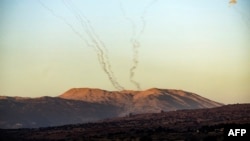Amos Hochstein, a senior U.S. envoy, made an unannounced trip to Beirut on Tuesday to cool tensions with Lebanon's interim prime minister and parliamentary speaker as the nation's southern border sees fighting between Israel and Hezbollah intensify.
"The United States does not want to see conflict in Gaza escalating and expanding into Lebanon," Hochenstein said at the meeting. He left without taking questions from reporters.
Days ago, a Lebanese grandmother and her three granddaughters were slain in an Israeli drone assault, raising a furor. In retaliation, Hezbollah, an ally of Hamas, lobbed rockets at the northern Israeli village of Kiryat Shmona, killing one person.
These bloody exchanges between Hezbollah and the Israel Defense Forces, or IDF, are in the spotlight as analysts debate whether the Israel-Hamas war could expand, opening new fronts in the region.
Hochstein said on Tuesday that quelling unrest along the Israel-Lebanon border is of "utmost importance."
"Protecting civilians is a main pillar of the rules of engagement with the enemy," Hezbollah lawmaker Ali Fayad said before a large crowd at the funeral for the slain grandmother and her three granddaughters.
The IDF considers the Iran-funded militant group a threat, saying Hezbollah has about 150,000 missiles and rockets ready to fire on Israel, as well as various high-tech material, including anti-ship missiles and deadly drones.
Since October 7, the cross-border skirmishes have killed at least 83 people in Lebanon, according to an Agence France-Presse tally — mostly Hezbollah fighters but also 11 civilians, including a journalist. In Israel, six soldiers and two civilians have been killed.
Some information for this report was provided by the Associated Press and Agence France-Presse.






